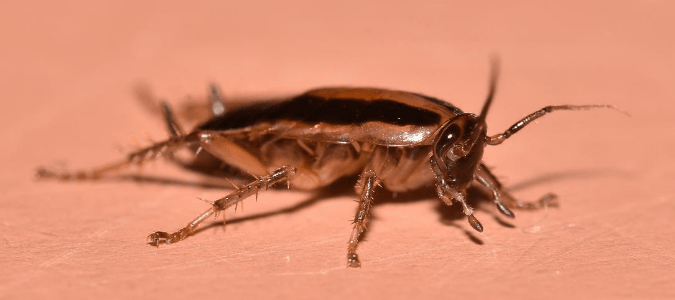Are you tired of using chemical insecticides that harm the environment and your health? Have you heard about using vinegar as a natural bug repellent? Many people claim that vinegar is an effective bug spray, but does it really work? In this article, we’ll explore the effectiveness of vinegar as bug spray, provide a simple recipe for homemade vinegar bug spray, and suggest alternative natural bug repellents to consider. Let’s uncover the truth about using vinegar as bug spray!
Key Takeaways:
- Vinegar is a natural bug repellent that many people claim is effective.
- Using vinegar as bug spray can be an eco-friendly alternative to chemical insecticides.
- There are alternative natural bug repellents to consider, in addition to or instead of vinegar bug spray.
The Effectiveness of Vinegar as Bug Spray
If you’re looking for a natural insect repellant, vinegar may be a solution. But does it actually work? Let’s explore the effectiveness of vinegar as bug spray and vinegar for insect control.
Studies have shown that vinegar is effective in repelling certain types of insects, such as fruit flies and some mosquitoes. The acetic acid in vinegar, which gives it its pungent smell and taste, is believed to interfere with the insect’s ability to detect certain scents.
While vinegar may not be as effective as chemical insecticides, it can still be a useful tool for reducing your exposure to harmful chemicals and protecting your home from insects. Vinegar can be used to control a variety of insects, including ants, cockroaches, and spiders.
To use vinegar as bug spray, simply mix equal parts water and vinegar in a spray bottle and apply to areas where insects are present or may enter your home. You can also add a few drops of essential oils, such as peppermint or lavender, to enhance the insect-repelling properties of the spray.
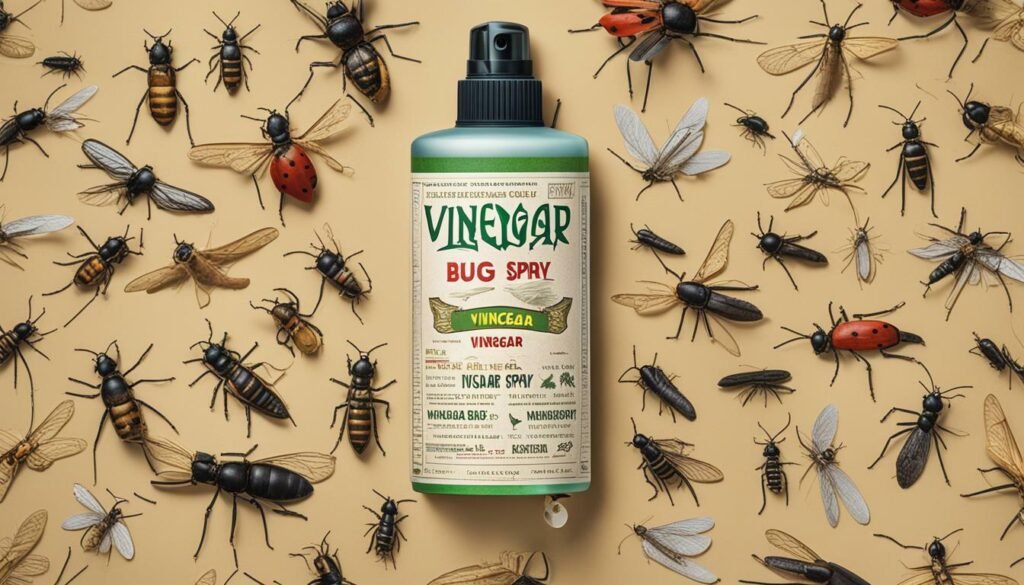

It’s important to note that vinegar may not be effective against all types of insects, and its effects may vary depending on the concentration of acetic acid and other factors. Additionally, vinegar can damage some surfaces and fabrics, so it’s important to test it on a small, inconspicuous area before using it on a larger scale.
In summary, vinegar can be a useful natural insect control method when used properly. Its effectiveness as a bug spray is supported by scientific studies, and it can be a safer, eco-friendly alternative to chemical insecticides. However, it may not be effective against all types of insects, and caution should be taken when using it on certain surfaces.
Using Vinegar as a Natural Insecticide
If you’re looking for a natural and eco-friendly way to keep bugs away, vinegar may be the solution you need. Not only is vinegar effective at repelling insects, but it’s also easy to make and use. Here’s a simple vinegar bug spray recipe you can try at home:
| Ingredients | Directions |
|---|---|
| White Vinegar | Mix equal parts vinegar and water in a spray bottle |
| Water | Shake well before use and spray on any areas where bugs tend to gather or enter your home |
Vinegar’s acidic properties make it an effective insecticide that can kill and repel a variety of pests, including ants, mosquitoes, and fruit flies. By using a vinegar mixture, you can create a barrier that keeps bugs away without the use of harsh chemicals or toxic pesticides.
However, it’s important to note that vinegar should not be used as a sole method of insect control for severe infestations. It’s best used as a preventative measure or as a supplement to other natural bug repellents.


When using vinegar bug spray, it’s important to keep a few tips and precautions in mind. First, make sure to test the mixture on a small, inconspicuous area before spraying it on a larger surface. Some surfaces may be sensitive to vinegar and could be damaged by its acidic properties.
Additionally, avoid using vinegar bug spray on plants, as it can damage or kill them. And although vinegar is generally safe for pets, it’s best to keep them away from areas where you’ve sprayed the mixture, as it may cause irritation if ingested or if it gets in their eyes.
Overall, incorporating vinegar as a natural insecticide can be a safe and effective way to repel bugs and keep your home pest-free. Give it a try and see how it works for you!
Alternative Natural Bug Repellents
While vinegar can be an effective natural bug repellent, it’s not the only option available. If you prefer to try something else or want to switch things up, there are plenty of other natural bug repellents you can make at home.
One popular option is homemade citrus spray. Simply boil a few cups of water and add slices of lemon and lime. Let the mixture steep overnight, strain, and pour into a spray bottle. Citrus scents are known to repel bugs, plus this spray will leave your home smelling fresh and clean.
Cedar and neem oil are also great natural bug repellents. Cedar oil can be used as a spray or diffused in the air, and neem oil can be mixed with water and sprayed on plants to keep insects away.
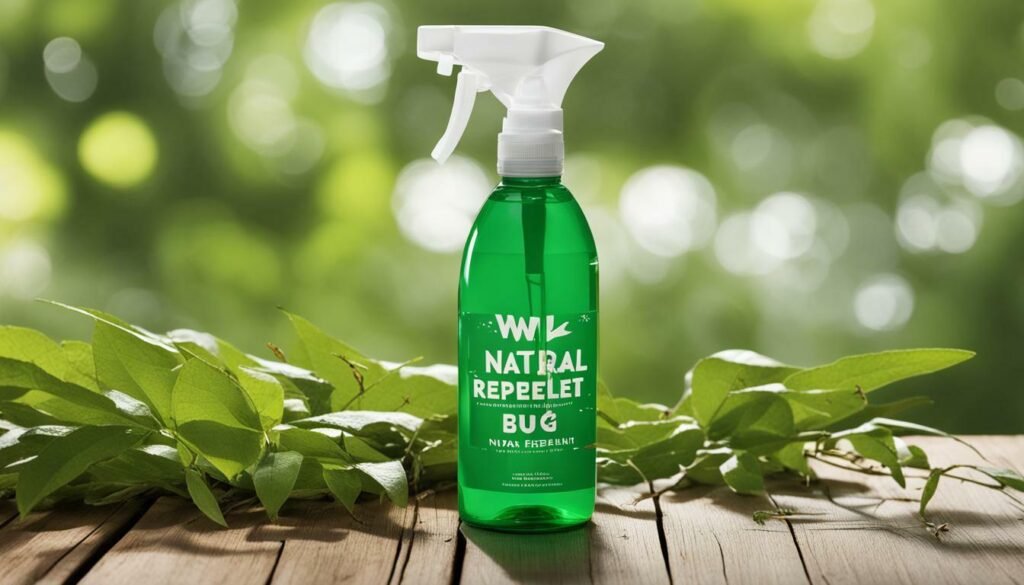

In addition to these DIY options, you can also find natural bug repellent products at your local health store or online. Look for products containing essential oils such as peppermint, eucalyptus, and lavender.
Remember, natural bug repellents may not last as long as chemical-based products, so you may need to reapply them more frequently. But by using these greener alternatives, you can keep pests at bay without harming yourself, your family, or the environment.
Benefits of Using Vinegar as Bug Spray
If you’re looking for a natural bug repellent, vinegar bug spray may be just what you need. Not only is it effective in repelling insects, but it’s also an eco-friendly alternative to traditional bug sprays. By using vinegar as a bug spray, you can protect yourself and your family from harmful chemicals while still keeping those pesky bugs at bay.
One of the most significant benefits of using vinegar bug spray is its effectiveness. Studies have shown that vinegar is a potent insect repellent, particularly against mosquitoes and flies. Its acidic properties make it difficult for bugs to land on and bite through your skin. This means you can spend more time enjoying the great outdoors without having to worry about bug bites.
Additionally, vinegar bug spray is easy to make and can save you money compared to purchasing traditional bug sprays. All you need is some white vinegar, water, and a spray bottle. You can also add essential oils like eucalyptus or peppermint to enhance the bug-repelling properties and make it smell nicer.
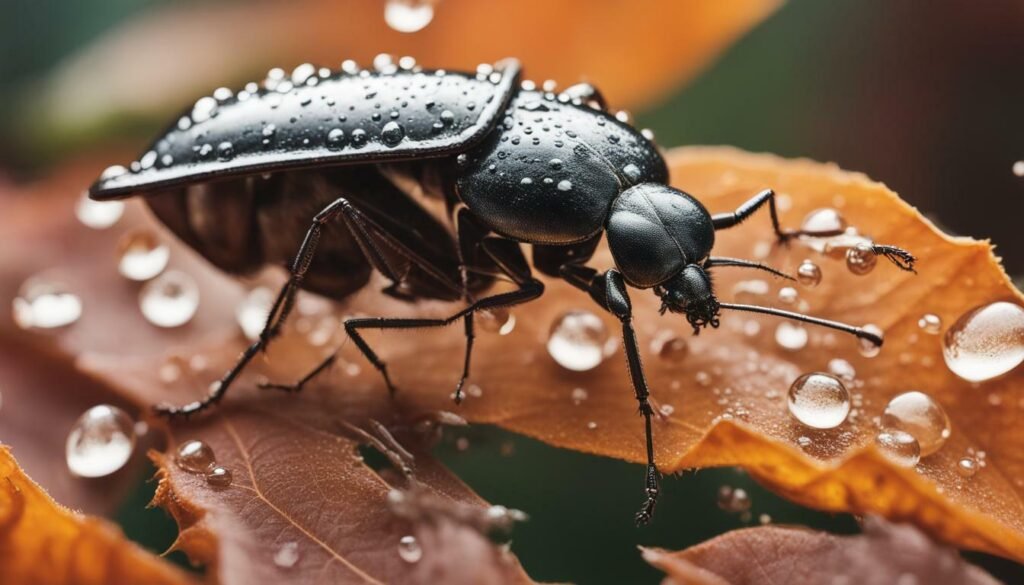

Another benefit of using vinegar as bug spray is that it’s versatile. You can use it both indoors and outdoors, making it a great all-around bug repellent. You can spray it around the perimeter of your home to keep bugs from coming inside, or use it on your skin to keep bugs away while you’re hiking, camping, or gardening.
Finally, using vinegar as bug spray is an eco-friendly choice. Traditional bug sprays often contain harmful chemicals that are toxic to both humans and the environment. By switching to vinegar bug spray, you’re reducing your carbon footprint and helping to keep the planet healthy.
Overall, vinegar bug spray is an effective, easy-to-make, and eco-friendly bug repellent that can help protect you and your family from pesky insects. Give it a try and see the benefits for yourself!
Tips and Precautions for Using Vinegar as Bug Spray
If you’re considering using vinegar as a natural bug repellent, there are a few tips and precautions to keep in mind to ensure maximum effectiveness:
- Be aware of vinegar’s scent: While vinegar is an effective bug spray, it does have a strong scent that can be overpowering. If you’re planning on using vinegar bug spray indoors, make sure to open windows and keep the room well-ventilated.
- Test on a small area first: Before applying vinegar bug spray to your skin, be sure to test it on a small, inconspicuous area first to make sure you don’t have an adverse reaction.
- Avoid vinegar near eyes and mouth: Be careful to avoid getting vinegar bug spray in your eyes or mouth, as it can cause irritation and discomfort.
- Reapply often: Vinegar bug spray is not as long-lasting as chemical bug sprays, so it’s important to reapply often for maximum effectiveness.
- Consider diluting vinegar: If the scent of vinegar is too strong for you, consider diluting it with water before applying as a bug spray.
By following these tips and taking necessary precautions, you can effectively use vinegar as a natural bug repellent to keep those pesky bugs at bay!


Scientific Studies on Vinegar and Bug Repellency
Many people wonder whether vinegar is an effective bug spray. Several scientific studies have explored the effectiveness of vinegar as a natural bug repellent and insecticide.
One study conducted in 2004 found that vinegar was able to repel certain species of mosquitoes. The study concluded that the acetic acid in vinegar was the active ingredient responsible for the repellent effects.
Another study published in 2014 found that vinegar was effective in repelling fruit flies. The study found that white vinegar was more effective than apple cider vinegar in repelling the flies.
While these studies suggest that vinegar can be an effective bug repellent, it is important to note that further research is needed to fully understand the effectiveness of vinegar as a bug spray. Additionally, the effectiveness of vinegar may vary depending on the type of insect and the concentration of vinegar used.
Despite the limited scientific research available, many people have reported success using vinegar as a natural bug repellent. Whether you are looking to avoid harsh chemicals or simply prefer a natural alternative, vinegar may be worth a try as a natural bug repellent.
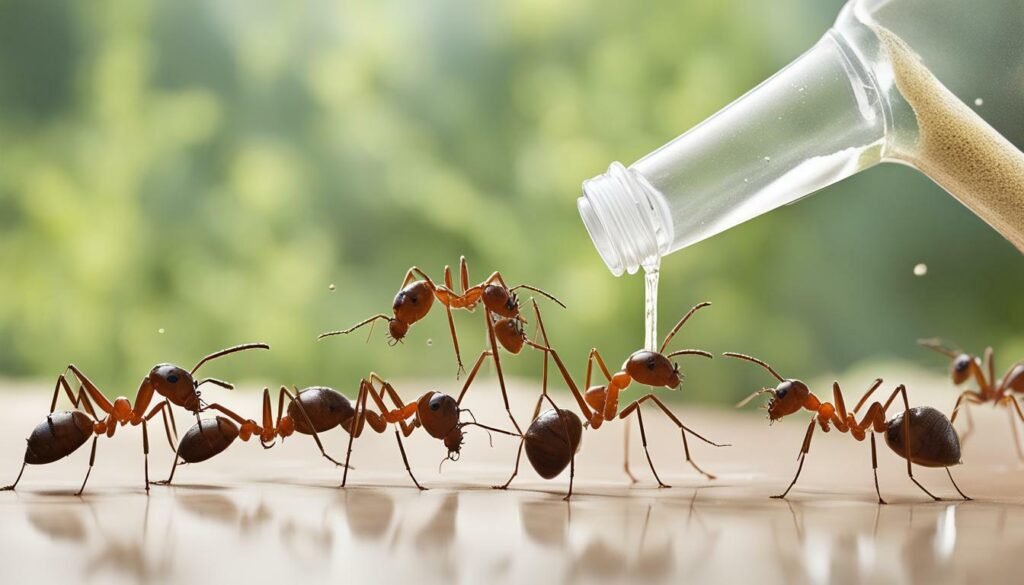

When using vinegar as a bug spray, it is important to dilute the vinegar as using undiluted vinegar may cause skin irritation. A mixture of equal parts water and vinegar is a good place to start. You can also add essential oils such as lavender or peppermint to enhance the effectiveness of the spray.
Overall, while scientific studies on vinegar and bug repellency are limited, many people have found success using vinegar as a natural bug repellent. Give it a try and see if it works for you!
Vinegar Bug Spray Effectiveness: Real User Experiences and Testimonials
Now that you know about the effectiveness of vinegar as bug spray and how it can be used as a natural insecticide, you may be wondering if it actually works. Well, the good news is that many people have had success using vinegar as a mosquito repellent and general bug spray.
One user wrote, “I’ve been using vinegar as bug spray for years and it works like a charm! Not only is it natural and eco-friendly, but it keeps the bugs away without any harmful chemicals.”
Another user reported, “I was skeptical at first, but I tried the homemade vinegar bug spray recipe and it really did keep the mosquitoes away. And it didn’t leave any sticky residue like some bug sprays do.”
Overall, vinegar can be a great alternative to traditional bug sprays filled with chemicals. Not only is it affordable and easy to find, but it’s also effective.


Give vinegar bug spray a try and see how it works for you. You may be pleasantly surprised by the results!
Greener Alternatives to Consider
If you’re looking for natural bug repellents that go beyond vinegar, there are plenty of DIY bug repellent options that are both effective and eco-friendly.
One option is to mix essential oils with water and use them as a spray. Citronella, lavender, and peppermint oils all work well to repel mosquitoes and other insects. Simply add a few drops of your preferred oil to a spray bottle filled with water and spritz away. You can also add witch hazel or apple cider vinegar to the mix for added bug-fighting power.
| Ingredients | Instructions |
|---|---|
| 10-15 drops of essential oil (lavender, citronella, peppermint) | Mix with 1 cup of water and 1 cup of apple cider vinegar or witch hazel. Pour into a spray bottle and shake well before using. |
Another option is to make your own insect-repelling candles using natural ingredients like beeswax, soy wax, and essential oils. Place the candles around your outdoor area to keep bugs at bay while you enjoy your time outside.
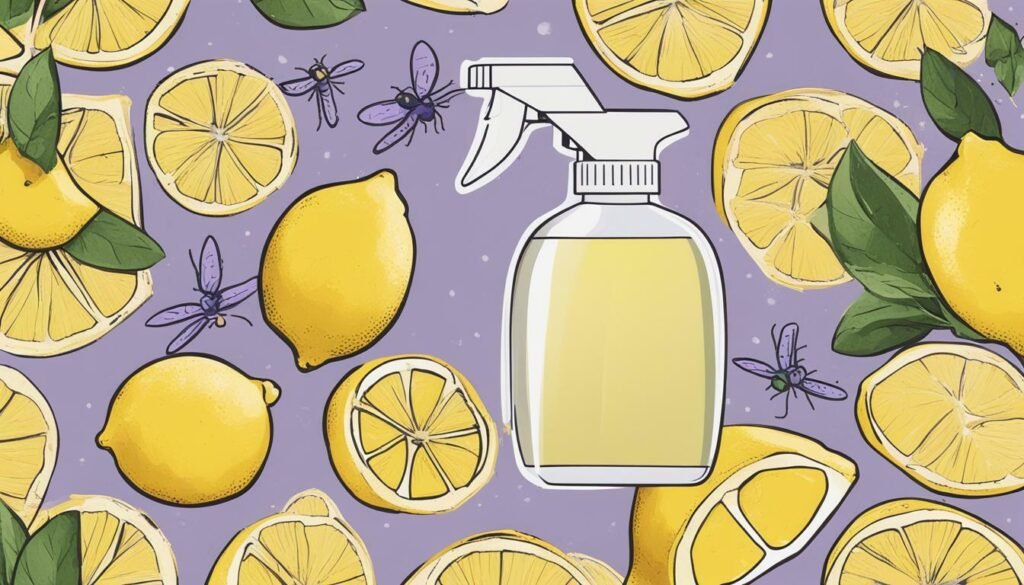

Whichever alternative you choose, just remember that going green doesn’t mean sacrificing effectiveness. These natural bug repellents will keep your home bug-free without harming the environment or your health.
Conclusion
After exploring the effectiveness of vinegar as a bug spray, it’s clear that it can be a great natural and eco-friendly option for keeping bugs at bay. While there is scientific evidence to support vinegar’s bug repellent properties, results may vary depending on the type of bug and the strength of the vinegar solution used.
If you’re looking for a simple homemade bug spray recipe, mixing equal parts vinegar and water can be a good place to start. However, there are also greener alternatives to consider, such as essential oil sprays or using plants like lavender and marigolds to naturally repel bugs.
Overall, using natural bug repellents is a great way to protect yourself and the environment from harsh chemicals and pesticides. So, whether you choose to use vinegar or explore other options, embracing natural bug control is a win-win for all.
FAQ
Q: Does vinegar work as bug spray?
A: Vinegar can be effective as a bug spray, particularly against certain insects like ants and fruit flies. However, its effectiveness may vary depending on the type of bug you are trying to repel.
Q: How do I use vinegar as bug spray?
A: To use vinegar as bug spray, you can dilute it with water in a spray bottle and apply it directly to areas where bugs are present or likely to be found. You can also add a few drops of essential oils for added effectiveness.
Q: Is vinegar bug spray safe to use around pets?
A: Vinegar is generally safe to use around pets, but it’s always a good idea to exercise caution and keep them away from areas where you have sprayed vinegar. Some pets may have sensitivity to the strong smell of vinegar, so it’s best to test a small area first.
Q: Can vinegar repel mosquitoes?
A: While vinegar may have some repellent properties, it is not as effective as other mosquito repellents such as DEET. If you’re looking for a natural mosquito repellent, there are better alternatives available.
Q: What are some alternative natural bug repellents?
A: There are several alternative natural bug repellents you can try, including essential oils like citronella, peppermint, and lavender. These can be used in combination with vinegar or on their own to effectively repel bugs.
Q: What are the benefits of using vinegar as bug spray?
A: Using vinegar as bug spray has several benefits. It is a natural and eco-friendly option, safe to use around children and pets, and can be easily made at home. It can also help repel certain insects and pests.
Q: Are there any precautions I should take when using vinegar as bug spray?
A: When using vinegar as bug spray, make sure to avoid contact with your eyes and sensitive areas of your skin. It’s also important to keep it away from surfaces that may be damaged by the acidity of vinegar.
Q: Are there any scientific studies on the effectiveness of vinegar as bug spray?
A: There have been some scientific studies conducted on the effectiveness of vinegar as bug spray, but results have shown mixed effectiveness depending on the type of bug and concentration of vinegar used. Further research is needed.
Q: What do users say about vinegar bug spray?
A: Users have reported varying levels of success with vinegar bug spray. Some have found it to be an effective natural repellent, while others have not experienced the same results. It may vary depending on individual preferences and bug types.
Q: What are some greener alternatives to consider for bug repellency?
A: If you’re looking for greener alternatives to bug repellency, you can consider essential oils, herbal remedies, or even physical barriers like screens and nets. These options provide natural bug protection without the use of chemical sprays.
Your Expert in Animal Control and Extermination. Trust our experience for humane, effective pest management, protecting your property and ensuring peace of mind with Michael S.





